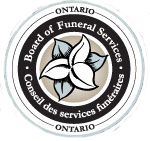Frequently Asked Questions
What is a funeral?
A funeral is a ceremony for a deceased person. The service gives the opportunity for family and friends of the deceased to gather and mourn the passing of their loved one, to share cherished memories and celebrate their life. A funeral is a vital first step to help the bereaved heal after the loss of someone special.
What type of service should I have?
If no pre-arrangements have been made, the type of service is entirely up to you. Services are usually held at a funeral home or a place of worship. There is a wealth of different services, ranging from a traditional religious or military service to something a little more non-traditional. Our funeral directors are more than happy to work with you to figure out what would be the most appropriate.
Can I personalize a funeral?
Of course you can. We encourage families to make their loved ones funeral a unique ceremony that represents who that person was in life. There is no right or wrong way to celebrate somebody’s life. Let the funeral director know exactly what your desires are and they will honour your wishes.
Do we need to have an obituary notice and what is included in one?
It is highly recommended to have an obituary notice that’s either placed in a local newspaper, or placed online. An obituary lets the public know that a death has occurred, and gives them information about the service. Obituaries generally include the deceased’s full name, age, city and date of birth and the city they were living in when they died. It also includes the name of the deceased’s spouse, along with the names of anyone else significant in their lives, such as parents, children or grandchildren. Space may be limited in a newspaper obituary, but you may include a little blurb on the life and legacy of the deceased. An online obituary or memorial website offers you the chance to add a lot more about the deceased.
Who are funeral directors and what do they do?
A funeral director is an an individual licensed to provide or direct the provision of funeral services. Funeral directors are in charge of all the logistics following a death. They complete all the necessary paperwork, make arrangements for the transportation of the body and put into action the choices made by the family in regards to the funeral service and the final resting place of the body. Beyond the logistics, funeral directors are there to provide support and guidance for someone coping with death.
What happens if the death occurs in the middle of the night or on the weekend?
We are here to help, funeral directors are available 24 hours a day, 7 days a week, 365 days a year.
What if a death occurs away from my home town?
We are here to help, we can arrange to have the remains transported home from anywhere in the world. We will assume responsibility and make the proper arrangements to have the remains returned to the community.
What is embalming and what purpose does it serve?
Embalming is the process of replacing blood and bodily fluids with a chemical solution to temporarily preserve the body. Embalming also slows down the decomposition process and enhances the appearance of a body damaged by traumatic death or illness.
Do I need to have an embalming?
No. In fact some religions forbid embalming. In Ontario, you are not required by law to embalm a body. We may recommend embalming based on the type of service you've chosen or due to the length of time between the date of death and the date of the service. You may choose to have the body washed and dressed without embalming. We are here to educate and advise you so you can make the best decision for your loved one.
However, if a deceased person is being transported to another country for funeral, burial or cremation, then embalming and a very tightly sealed casket or container may be required by the receiving country
or the company transporting the body, such as an airline.
How much does a funeral cost?
The cost of the funeral varies depending on the wishes you have. The cost includes all professional services including transportation, embalming and other preparations, the use of a facility for the ceremony, and the purchase of funeral merchandise (casket, urn, vaults, stationery, etc.).



